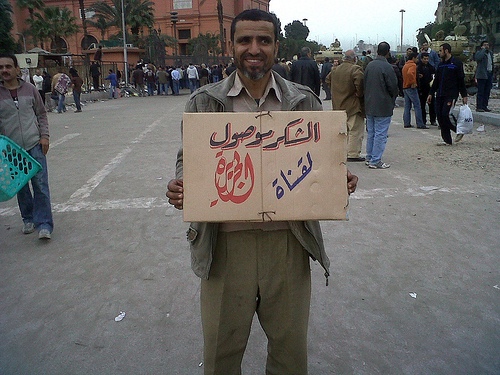al jazeera
Recent events in Tunisia, Egypt, and Libya have been on the minds -- and on the screens -- of people around the world. News organizations are covering the events in innovative ways, and people have noticed. More generally, the role of social media itself in protests and revolutions is also being debated
The Association for International Broadcasting (AIB) has expressed its concern at the continuing disruption to transmissions of a number of its members. Deliberate, harmful Interference has been noted to the satellite transmissions of Alhurra, Al Jazeera and Deutsche Welle since unrest began in a number of North African and Middle Eastern countries.
The events from Tunisia and Egypt to Yemen and now Libya also shined a spotlight on Al Jazeera, as the Qatar-based news network used its well-positioned reporters to garner scoops and become, almost overnight, a new must-view for millions of global citizens interested in the big Middle East story.

First, let’s be clear that this was the Egyptian Revolution, not the “Facebook Revolution” or the “Twitter Revolution.” Events of the past few weeks belong wholly to spirit of the Egyptian people, not technology. And although it was built on democratic aspirations, this was not a revolution that drew any inspiration from the United States.
For the past few weeks, a parallel plot line to the revolutions in the Arab world has been playing out in the media. With rare exceptions, the largest American cable and satellite providers simply do not provide viewers access to Al Jazeera English, the cousin to the powerful Qatar-based world news network.
Glued to television sets in Ramallah’s shisha cafes, Palestinians have been watching al-Jazeera television attentively as Egyptian people rise up from Alexandria to Cairo. Looking on with admiration as tens of thousands fill the streets during the January 28th “Day of Rage”, cheers erupt through the cafes with every police retreat and every Molotov cocktail that lands on security vehicles.
"Long live Al Jazeera!" chanted Egyptian protesters in Tahrir Square on Feb. 6. Many Arabs -- not least the staff at Al Jazeera -- have said for years that the Arab satellite network would help bring about a popular revolution in the Middle East. Now, after 15 years of broadcasting, it appears the prediction has come true.
The wave of protests in the Arab world has highlighted the power of Al-Jazeera, which has unparalleled influence in the Middle East. It has been banned from reporting on the unrest in Egypt, where its reporters have been targeted by Mubarak supporters. Governments in the region fear the station could be their undoing.







